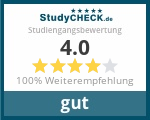Gertraud Wolf
2021 | Master Civil and Environmental Engineering

Career Development
During my Bachelor's degree in Environmental Engineering at the THD, my focus was already on technical building equipment (TGA) and Building Information Modelling (BIM). I have been involved in building services engineering from the 4th semester to the present day. As I also wanted to consolidate the theory in practice, I have been working in an engineering office for technical building services ever since. I also chose my specialisations for the Master's degree course in Civil and Environmental Engineering accordingly. While I spent my free study days working on the planning of technical systems, I still had another focus: working on planning processes as efficiently as possible, with networking and with a high degree of digitalisation. This led me to my second specialisation, BIM.
After completing my Master's degree in the summer semester of 2021, I joined the same engineering firm as an internal BIM manager. This was followed by further training in the field of BIM in order to introduce the methodology within the office together with my BIM team, define standards and implement them in projects. In addition to my work as a BIM manager, I also work as a research assistant in the field of teaching and research with the aim of obtaining a doctorate and as a freelance honorary lecturer in my two specialisations. Since the summer semester 2024, I have also been able to return to DIT. This time not as a student, but as a lecturer in the field of TGA.
Reminiscing allowed: remember your student days
DIT and the Faculty of Civil and Environmental Engineering in particular, has a family atmosphere. You know your fellow students here, which has a corresponding effect on the team spirit during and after your studies. There were many wonderful moments, celebrations and memories that I look back on today. Friendships developed during the preparatory course and are still going strong today. Friends with whom we went through some ups and downs during certain modules. But we made it! When I'm in the city of Deggendorf, I sometimes deliberately park near the campus rather than in the city centre. Just to walk past the buildings, stroll around the campus and reminisce.
What advice would you give to today's students?
"Focus - Concentrate - Realise!"
This motto emerged from our final excursion and has stayed with me ever since.If you have your goals in mind, you can achieve anything!
There are many paths open to you in the field of civil and environmental engineering.By choosing the right subjects, you can focus and concentrate on various areas at the BIW faculty and realise them professionally later on.
Take advantage of the continuing education programmes at the university.The specialist symposia and trade fairs were particularly helpful to me.These are a good opportunity to network with experts from the field during your studies. As a student, you have nothing to lose. On the contrary: networking will be important for you later in your career. So it's all the better if you can pick up this skill during your studies.
At the end of the semester (or day), don't forget to enjoy your time at university, because it's a once-in-a-lifetime experience!








